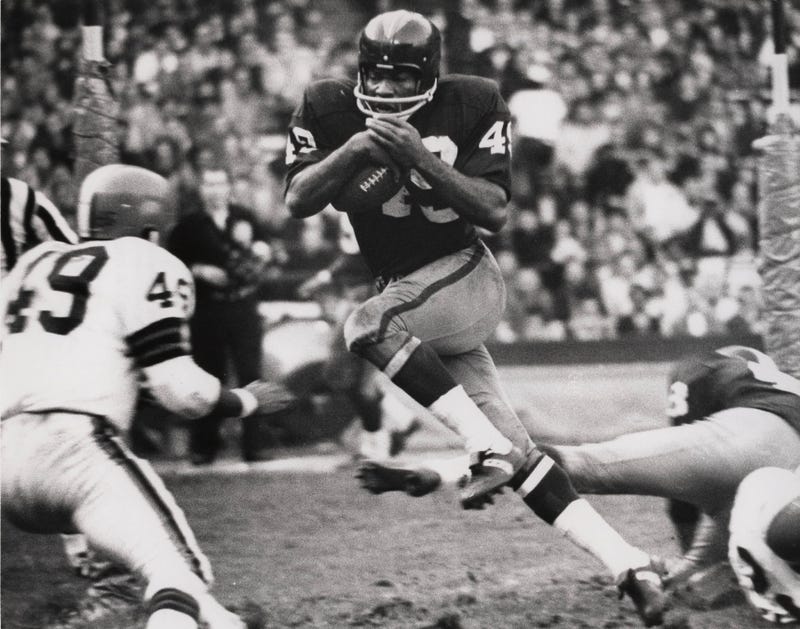
As stunning as the song he was standing up for was, what happened next shocked Bobby Mitchell. It was a poke in the back, followed by the command, "Sing Bobby Mitchell, sing!"
The poke and the command came from his new boss, Redskins owner George Preston Marshall, at the team's welcome home luncheon just before the start of the 1962 season.
The song was "Dixie."
Growing up in Arkansas, Mitchell had thought of Washington, D.C. as a northern city with values far different from the deep south, where the civil rights movement was just beginning it's backlash against the segregationists. Now he was being forced to sing a song that cut deep into his pride.
In the days before the television networks started dumping billions into the NFL war chest, split evenly among the teams, Marshall and his fellow owners made their own TV and radio deals.
With no team based between D.C. and Key West, Florida, Marshall was able to claim the south as Redskin territory. He put together a network of 60 radio stations and 29 television stations to broadcast games. And he knew what played well in the south – an all-white team.
Never mind that those Redskins – or whiteskins – were terrible. Just three winning seasons in the 17 years since the end of World War II, but Marshall was still profitable.
Prior to the 1961 season, Marshall signed a lease to play at newly constructed D.C. Stadium (later renamed RFK Stadium). The stadium was built on federal land, which ultimately put an end to Marshall's refusal to break the color line, 15 years after Jackie Robinson integrated baseball.
Early in '61, Secretary of the Interior, Stewart Udall, with the support of President John F. Kennedy, informed Marshall that federal laws prohibited discrimination and since the stadium was on federal land, he needed to integrate his team in order to play there.
Marshall acted stunned, telling a reporter, "I am surprised that with the world on the brink of another war, they are worried about whether or not a Negro is going to play for the Redskins."
He also cited legal grounds, claiming the lease he had signed contained no such language. He said it was illegal to change the terms.
Ultimately, young NFL Commissioner Pete Rozelle stepped in and a compromise was reached, where the Redskins would play the 1961 season at D.C. Stadium with an all-white roster, but would have to integrate by 1962.
No shock, the Redskins finished 1-12-1 in 1961.
Coincidentally, Ernie Davis became the first black Heisman Trophy winner playing the 1961 season at Syracuse, and with the Redskins, by way of the worst record, picking first, it was assumed that Davis would break the team's color line.
But Davis made it known that he wasn't crazy about playing for a racist owner and might consider going to the upstart American Football League.
The Redskins did draft Davis, but less than two weeks later, sent his draft rights to the Cleveland Browns for Mitchell.
Although he'd been playing in the shadow of the great Jim Brown, Mitchell wasn't anxious to leave. While Brown got the bulk of the carries, Mitchell, who had been as much of a track star as he was a football star at the University of Illinois, returned kicks and caught passes and was playing for a winning team. Now he was headed to the worst team in the league and would be forced into the role of trailblazer. The indignity of the welcome home luncheon was only part of what he had to endure. Years later, he talked about having his shoe spat on while dining at Duke Zeibert's Restaurant.
Mitchell's hurt was soothed a bit when he was given the biggest contract in team history – a whopping $18,000. A breakout season followed. A position switch from halfback to flanker (think Jamison Crowder), Mitchell led the NFL with 72 catches for 1,384 and 11 touchdowns in a 14-game schedule. And that was with a rookie quarterback, Norm Snead.
When Snead was traded for Sonny Jurgensen in 1964, Mitchell now had an arm to match his skills. Mitchell retired just before the start of the 1969 season – with numbers that would put him in the Hall of Fame in 1983 – and joined the Redskins' front office as a scout.
Mitchell eventually rose to assistant general manager, but was hurt when he was passed over for the top job when Bobby Beathard left after the 1988 season.
He stayed with the team until the end of the 2002 season, when one final slight caused him to finally walk out the door. While the Redskins have officially retired only one jersey number, Sammy Baugh's 33, they have kept numbers of Hall of Famers and certain others like Joe Theismann's 7 out of circulation. During the 2002 season, Mitchell's 49 was given to a backup tight end named Leonard Stephens.
Enough was enough for a proud man who'd given so much to a team and city.
